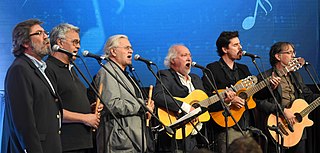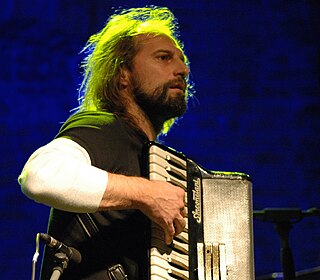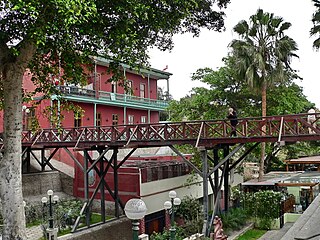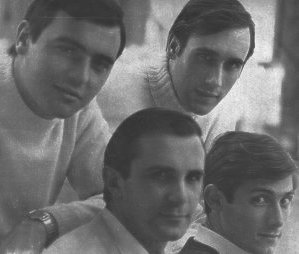
The music of Argentina includes a variety of traditional, classical and popular genres. One of the country's most significant cultural contributions is the tango, which originated in Buenos Aires and its surroundings during the end of the 19th century and underwent profound changes throughout the 20th century. Folk music was particularly popular during the 20th century, experiencing a "boom" in popularity during the 1950s and 1960s thanks to artists such as Atahualpa Yupanqui and Mercedes Sosa, prominent figures of the Nuevo cancionero movement. In the mid-to-late 1960s, the countercultural scene of Buenos Aires originated Argentine rock, considered the earliest incarnation of Spanish-language rock for having an autochthonous identity that differed from that of England or the United States. It was widely embraced by the youth and since then has become part of the country's musical identity as much as traditional music. According to the Harvard Dictionary of Music, Argentina also "has one of the richest art music traditions and perhaps the most active contemporary musical life.

Quilapayún are a folk music group from Chile and among the longest lasting and most influential ambassadors of the Nueva Canción Chilena movement and genre. Formed during the mid-1960s, the group became inseparable with the revolution that occurred in the popular music of the country under the Popular Unity Government of Salvador Allende.

Canciones folklóricas de América is the third studio album by Chilean singer-songwriter Víctor Jara, and second by Chilean folk group Quilapayún released in 1967, on the EMI and Odeon labels.

Horacio "Chango" Spasiuk is an Argentine chamamé musician and accordion player.

The 7th Annual Latin Grammy Awards were held for the first time in New York City, NY. The awards show was held at Madison Square Garden on Thursday, November 2, 2006. Shakira was the big winner winning Album of the Year, one of four awards that she won. She is the first female artist to win Record of the Year, Album of the Year, and Song of the Year.

Piero De Benedictis is an Italian-born Argentine singer/songwriter who also holds Colombian citizenship.

Carlos Rivero is an Argentine author and composer, musician and music teacher, born in San Juan. He developed an intensive professional career as a folk percussion performer.
The 8th Annual Latin Grammy Awards took place on Thursday, November 8, 2007, at the Mandalay Bay Events Center in Las Vegas, Nevada. The show aired on Univision. Juan Luis Guerra was the night's big winner, winning 5 awards including Album of the Year. Juan Luis Guerra was honored as the Latin Recording Academy Person of the Year one night prior to the telecast.

César Isella was an Argentinian singer and songwriter of folk music. He joined Los Fronterizos from 1956 to 1966, was one of the main figures of the "Movement of the New Songbook", and in the 1990s he discovered and sponsored the singer Soledad Pastorutti. He has written the music for "Canción con todos", regarded as the Latin American anthem.

Los Huasos Quincheros are a popular Chilean folk musical group, first formed in 1937. It currently consists of the musicians Antonio Antoncich, Jose Vicente Leon and Rafael Prieto. The group was nominated for an International Music Prize in 1970.

Teresa Adelina Sellarés, best known as Teresa Parodi, is an Argentine singer and songwriter. She held the inaugural post of Minister of Culture of Argentina from May 6, 2014, to December 9, 2015. She was a deputy to the Mercosur Parliament (Parlasur) representing the nationwide district of Argentina from December 10, 2015, to October 6, 2016. She was elected on the Front for Victory ticket in the 2015 election.

Ana María Francisca Adinolfi was an Argentine singer and actress, known for participating in the music program El Club del Clan, along with Palito Ortega, Raúl Lavié, Johnny Tedesco and Chico Novarro.
The 21st Annual Premios Gardel ceremony were held on May 14, 2019. The TNT Latin America networks broadcast the show live from the Ángel Bustelo Auditorium in Mendoza. It was the first time that the ceremony was held outside Buenos Aires. The ceremony recognized the best recordings, compositions, and artists of the eligibility year, which ran from January 1, 2016 to January 31, 2016. The nominations were announced on April 16, 2019 at the Néstor Kirchner Cultural Centre in Buenos Aires.
This article includes an overview of the major events and trends in Latin music in the 1980s, namely in Ibero-America. This includes recordings, festivals, award ceremonies, births and deaths of Latin music artists, and the advancement and adjournment of the genre from 1980 to 1989.

Leda Valladares was an Argentine singer, songwriter, musicologist and folklorist, and poet. Born in San Miguel de Tucumán in northern Argentina, she grew up surrounded by both classical European music and the folk music of the Amerindian people living in the area. From a young age she studied piano and in her teens began a band with her brother that explored folk music, jazz, and blues. She published works of poetry throughout her life. Although she began her university studies at the National University of Tucumán as an English major, after a year she changed course and studied philosophy and education, graduating in 1948. Her schooling was interrupted by a foray into the study of music at the Academy of Fine Art and in independent research among those who performed traditional folk music.

"El puente de los suspiros" is a song written and performed by Chabuca Granda. The song is a Peruvian waltz in the "música criolla" style.
The 23rd Annual Premios Gardel ceremony was held on July 23, 2021, and it was presented with no in-person ceremony due to the COVID-19 pandemic. The television broadcast of the show was in charge of the TNT Latin America, while LRA Radio Nacional provided radio coverage. The ceremony recognized the best recordings, compositions, and artists of the eligibility year, which ran from January 1, 2020 to January 31, 2020. The nominations were announced on May 7, 2021. The ceremony was hosted by television personalities Jey Mammón and Eleonora Pérez Caressi.

El Consorcio is a Spanish singing group from Bilbao, formed in 1993 by singers Amaya, Estíbaliz and Iñaki Uranga, Carlos Zubiaga and Sergio Blanco, all of them past members of the singing group Mocedades. In 2016 they received the Latin Grammy Lifetime Achievement Award.

Cuarteto Zupay or simply Los Zupay, was an Argentinian Popular Music group formed in Buenos Aires in 1966 that remained active until 1991. The founding members were the brothers Pedro Pablo García Caffi (baritone) and Juan José García Caffi, Eduardo Vittar Smith (bass) and Aníbal López Monteiro.

The folkloric music of Argentina traces its roots to the multiplicity of native indigenous cultures. It was shaped by four major historical-cultural events: Spanish colonization and forced African immigration caused by the slave trade during the Spanish domination ; the large wave of European immigration (1880–1950) and the large-scale internal migration (1930–1980).
















